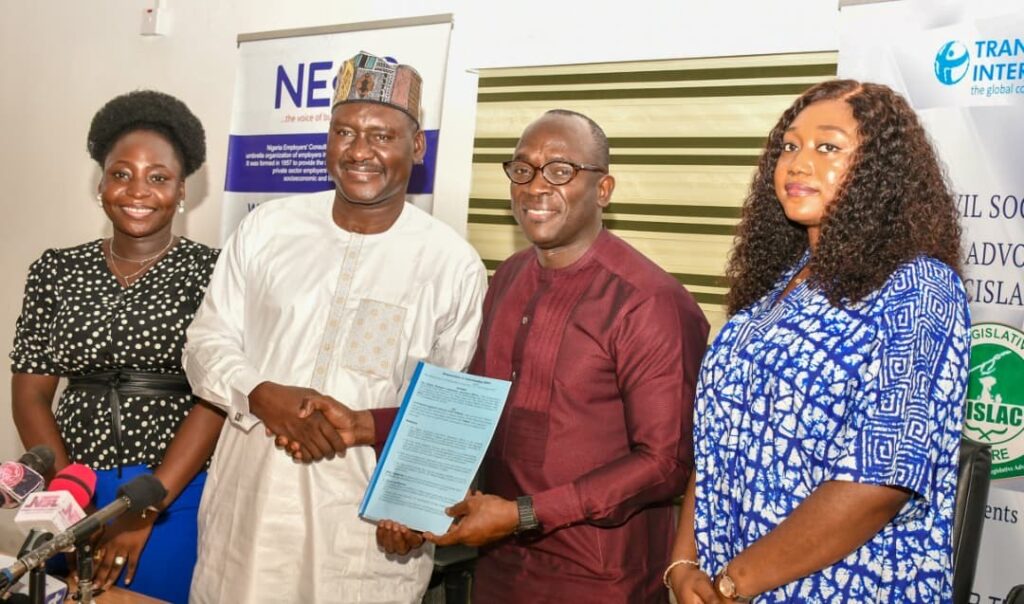From Juliana Taiwo-Obalonye, Abuja
In a significant advancement for labour relations and business collaboration in Nigeria, the Civil Society Legislative Advocacy Centre (CISLAC) and the Nigeria Employers’ Consultative Association (NECA) have formally signed a Memorandum of Understanding (MoU) aimed at fostering cooperation to enhance workers’ welfare, promote fair business practices, and drive sustainable economic growth.
At the signing ceremony, the Executive Director of CISLAC, Auwal Musa Rafsanjani, described the MoU as a “defining moment in the history of labour relations in Nigeria.” He emphasised the partnership as “a covenant of trust between civil society, employers, and the Nigerian worker,” underscoring the imperative that “the dignity of labour, the welfare of our workforce, and the productivity of our nation can no longer be negotiable—they must be guaranteed.”
Rafsanjani highlighted the vital contributions of Nigerian workers across sectors, stating, “Teachers shaping our future leaders, health workers standing on the frontlines of crises, farmers feeding our people—these sacrifices have often been undervalued. Labour is not a commodity. Workers deserve fair wages, safe workplaces, and respect.” He added, “When workers thrive, businesses prosper, and society flourishes. This MoU binds us to ensure that every Nigerian worker can look to the future with confidence, pride, and renewed strength.”
The MoU outlines a framework for collaboration with key objectives, including enhancing public policy through evidence-based advocacy, promoting decent work and labour rights, improving ease of doing business, fostering responsible corporate conduct, addressing critical issues such as health and climate change, and strengthening capacity in both public and private sectors.
The partnership will facilitate coordinated advocacy campaigns, joint research, and capacity-building programmes. Rafsanjani pledged on behalf of CISLAC a commitment to “boost the confidence and productivity of the Nigerian worker” through accountability, partnership, and sustained advocacy for a just and people-centred governance.
Rafsanjani acknowledged the gravity of Nigeria’s labour challenges, noting, “Though the official unemployment rate is near 5%, underemployment and informal work leave millions vulnerable. These are families struggling with school fees, healthcare, and job market despair. Changing this requires investing in education, skills, social protection, and fair workplace policies.”
Concluding, he reiterated the shared vision: “Work is dignity, justice, and hope. When we empower workers and employers alike, we empower Nigeria.”
Director-General of NECA, Adewale-Smatt Oyerinde, expressed deep appreciation to CISLAC, saying, “To our partners at CISLAC, we are truly honoured to have you here. Your reputation as a leading voice for good governance and legislative reform is well-known.” This partnership, he highlighted, is not just a formality but a “momentous occasion” signalling a strategic collaboration.
The Director-General elaborated on the distinct yet complementary roles of the two organisations. NECA serves as “the voice of organised business,” championing “enterprise sustainability, decent work, economic renaissance, responsible business conduct and to advocate for a conducive business environment.” Meanwhile, CISLAC has excelled in promoting “transparency, accountability, and the protection of civil rights,” acting as a “crucial watchdog” to ensure policies serve public interests.
Oyerinde addressed a common misconception: “While some may see the private sector and civil society as operating in separate spheres, we recognise a profound shared interest.” He emphasised that “a business cannot thrive in an unstable or less transparent environment” and that “our shared goals of a transparent, predictable, and fair Nigeria, both economically, socially, and industrially, are not just complementary; they are inseparable.”
He described the MoU as “not merely a document; it is a symbol of our mutual commitment to advocating towards tackling Nigeria’s most pressing challenges together.” The partnership will leverage their combined strengths in research, advocacy, and networks to “create a more powerful voice for our nation’s economic renaissance.”
The collaborative focus will cover pivotal areas, including public policy, responsible business conduct, taxation, ease of doing business, decent work, climate change, and gender issues. Oyerinde outlined these priorities succinctly: “Our joint efforts will focus on key areas such as influencing policy formulation, promoting ethical business practices, advocating for a fair tax system, removing enterprise bottlenecks, ensuring labour rights, advancing sustainable initiatives, and advocating for equal rights for women.”
Concluding on a hopeful note, he affirmed, “This partnership is a clear demonstration that progress is best achieved through collaboration, not division.” Oyerinde’s confidence resonated: “I am confident that this alliance will yield significant results for our members, for the business community, and for the entire nation.”
The MoU formalises roles and responsibilities, clarifying that NECA will provide private sector perspectives and facilitate business platforms, while CISLAC leads public policy advocacy and civil society mobilisation. Both entities will jointly engage on issues such as labour market challenges, ethical business practices, tax reforms, occupational safety, climate responsiveness, and sustainable development goals (SDGs).
The three-year MoU establishes governance via a Joint Steering Committee with equal representation, ensuring regular progress reviews and strategic coordination. Funding will come from joint contributions, grants, and sponsorships, with each party covering its administrative costs.


